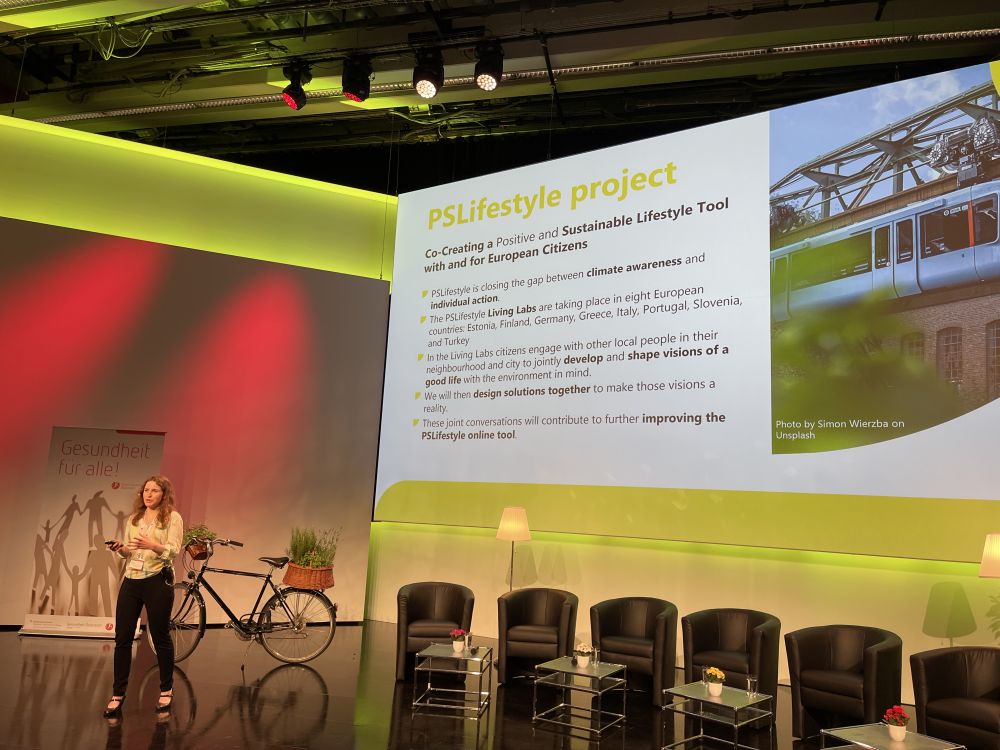News
Playing for a good life - PSLifestyle explores citizen engagement through an innovative card game
25 July 2022
On June 21st 2022, PSLifestyle partners' EuroHealthNet and CSCP were invited to contribute to the 24th Austrian Health Promotion Conference with a workshop on the theme of “health and equity co-benefits of citizen engagement in sustainability”.
The PSLifestyle project aims to close the gap between climate awareness and individual action by co-creating a positive and sustainable lifestyle tool with and for European citizens. Within this, a focus on the lifestyle areas of housing, mobility, food and consumption means that there are close links with health and its interaction with climate-friendly living. At the heart of the PSLifestyle Living Labs approach is the bringing together of diverse groups of residents across the 8 pilot locations, grounded in inclusive and accessible recruitment and facilitation methods to enable people to explore the topics collectively.
The PSLifestyle workshop in Linz aimed to share with participants some of the key findings so far from this approach to citizen engagement, as implemented in the first round of PSLifestyle Living Labs, and highlight some of the ways in which creative interactive methods can be used to engage residents in climate, equity and health topics. It’s one thing to talk about interactive engagement methods, but really the best way to learn about them is for an individual to experience it for themselves – in order to understand how it feels to participate and what might work for different groups of people.
Bringing citizen engagement methods alive
In order to bring this topic alive, EuroHealthNet and CSCP adapted Situation Lab’s Creative Commons card game “The Thing from the Future” to the health and climate topic, and played it with the workshop participants in small groups. The game is a fun, interactive method of idea generation, and can be played in various forms, from small groups to a whole-room game, in a variety of contexts.
So, how did it work in Linz? Essentially, there were three categories of prompts in different piles of cards: challenges, themes and actors. The group shuffled these and turned one of each over. These then acted as a set of prompts, for which they as individuals had 3 minutes to come up with a health and climate related idea. The challenge card set out the particular issue for which they had to find a solution; the theme card gave the type of solution; and the actors card shared the people who would be enacting it. When the time was up, everyone shared their idea with their group and they collectively decided on a winning idea. These were then shared with the whole workshop after each round.
A tool for opening up the creative process
One of the best things about using a game like this is the way it challenges individuals to come up with ideas that link combinations of parameters, which they might not normally bring together. For example, one might think that there’s not an obvious solution to the challenge of water pollution, through a food-related project, in a centre for older people. However, the game mechanism forces players into finding a way to link things together, find commonalities and often generate quite innovative ideas. The fact that the process comes in the form of a game makes it less intimidating to dive into.
In the workshop, participants shared ideas, for a range of card combinations, from: live allergen data apps, to green walls in offices, to use of empty buildings to create meeting places for the community to run activities to improve mental wellbeing. The participants afterwards reflected that they were challenged by some of the combinations that the cards gave them – but were pleasantly surprised that they always still managed to find a solution, and had a lot of fun through the process.
Games and other interactive activities form part of the methodology of our PSLifestyle Living Lab meetings, where through inclusive methods we explore topics of sustainable behaviours and lifestyles with a range of citizens, co-developing the PSL Tool in the process. To stay up-to-date on our next lab meetings in Estonia, Finland, Germany, Greece, Italy, Portugal, Slovenia and Turkey, follow us on Twitter and LinkedIn and sign up for our newsletter for opportunities to get involved.
All news
This project has received funding from the European Union’s Horizon 2020 research and innovation programme under grant agreement No 101037342.
